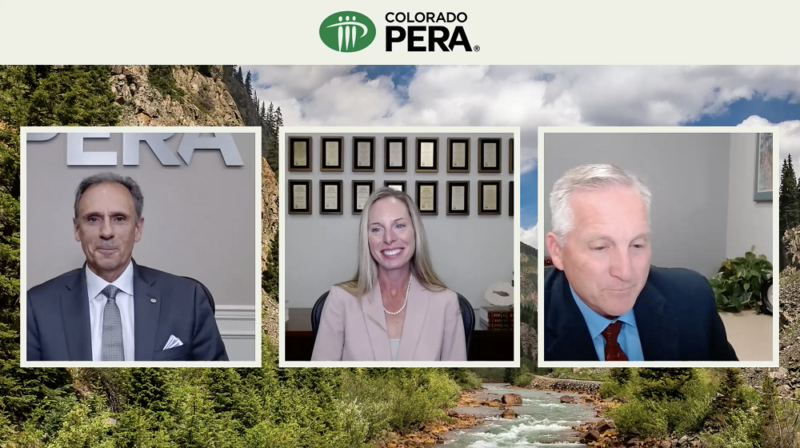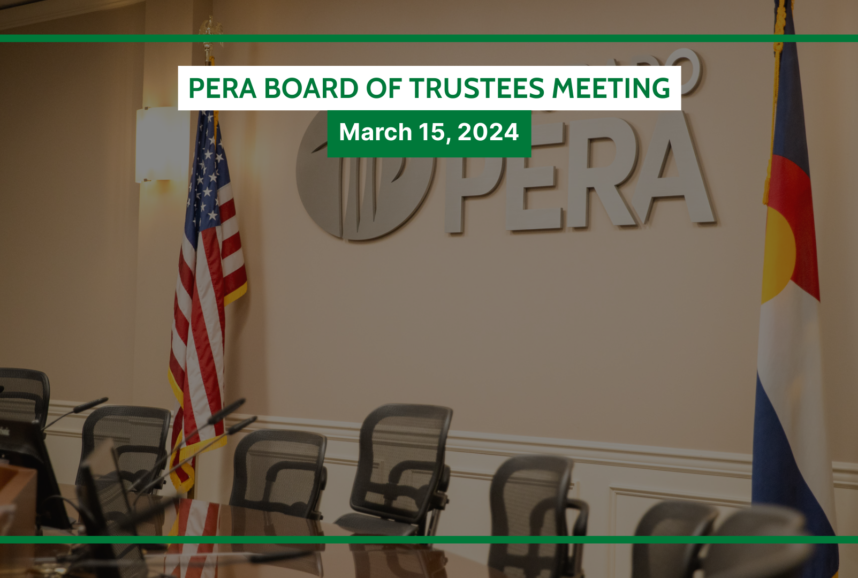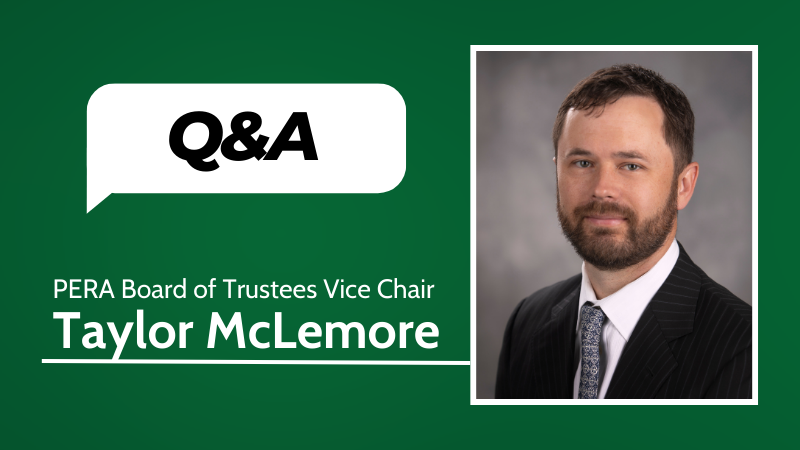On Thursday, July 7, PERA held two virtual town halls with Executive Director Ron Baker and Chief Investment Officer/Chief Operating Officer Amy C. McGarrity.
More than 3,400 PERA members and retirees joined the town halls live on the web, on the phone and on social media to ask questions. Topics of discussion included PERA’s recently released 2021 Annual Comprehensive Financial Report, as well as current economic conditions, PERA-related legislation, and other topics of interest to members and retirees.
Below are summaries and video clips of some of the topics covered during this year’s town halls. To view full recordings of each event, visit copera.org/townhall.
How did PERA do financially in 2021?
For the year that ended Dec. 31, 2021, PERA’s investment portfolio earned a return of 16.1% net of fees, surpassing its benchmark of 13.7%. Over the past 10 years, the fund has earned an annualized return of 10.9% versus its benchmark of 10.1%.
The value of the total fund increased to $65.6 billion in 2021, up from $58.3 billion at the end of 2020. PERA’s funded status at the end of the year was 67.8%.
What is the impact of current market conditions on PERA’s investments?
PERA’s portfolio is strategically designed to perform over long periods of time — not just several years but several decades, McGarrity said. PERA is invested in public and private markets and so our portfolio is experiencing volatility in the short term. Downturns can and do happen in a given year, but the Board’s strategic diversification of the portfolio is meant to ensure the Fund continues to earn returns over the long term.
Why isn’t the Annual Increase paid to retirees keeping up with inflation?
The amount of PERA’s annual increase is set in statute and is not tied directly to inflation. It can adjust up or down based on PERA’s funding progress, along with member and employer contributions. PERA staff and the PERA Board cannot change the amount of the Annual Increase, Baker said, only the General Assembly can.
“In terms of what PERA can do as an organization, is trying to do, especially for our retired members, is we are working hard for those of you in PERACare to continue to reduce cost to the extent that we can, knowing that healthcare is a large component of retirees’ [financial] situation in retirement,” Baker said.
How did the 2022 legislative session affect PERA?
The Colorado General Assembly passed several PERA-related bills in 2022. One of those bills directed the state to make up the state’s missed 2020 direct distribution payment of $225 million to PERA. Under HB22-1029, PERA received $380 million from the state on July 1.
That amounts to a restoration of the missed $225 million direct distribution plus a prepayment of a portion of future direct distributions to PERA.
“I am excited about the fact that the bill was passed on a strong bipartisan basis,” Baker said. “Which means Republicans and Democrats felt it was important to backfill the promise to Colorado PERA.”
Lawmakers also passed HB22-1057 and HB22-1101, which expand the ability of PERA retirees to work after retirement without a reduction in benefits.
HB22-1057 temporarily waives working after retirement limits for qualified service retirees working as substitute teachers in any school district while there are critical substitute teacher shortages. HB22-1101 expands provisions that had been scheduled to repeal on July 1, 2023 that allow PERA service retirees to work full-time in certain roles, without a reduction in benefits, for a rural school district that has determined there is a critical shortage of qualified individuals for these positions.
What’s the latest on the Windfall Elimination Provision (WEP) and Government Pension Offset (GPO)?
Several pieces of legislation have been introduced in Washington, DC to modify or repeal the WEP and GPO, which can reduce Social Security benefits for PERA benefit recipients. While similar legislation is introduced each session and PERA engages with Colorado’s congressional delegation to educate them on how the WEP and GPO affect PERA members, Congress has not taken any action, citing the cost.
“The federal government has not come up with a compromise as to where those additional dollars to pay for giving more of a Social Security benefit would come from,” Baker said.
Is PERA divesting from fossil fuels?
“The Board has a philosophy statement surrounding Divestment that we will execute Divestment as mandated by the state or federal governments, but otherwise choose not to divest,” McGarrity said. “The reason for that is we believe allowing the investors, either internal or external, the broadest possible universe from which to choose investments enables us to outperform for the long term.”
Learn more about the PERA Board’s stance on Divestment here.
Is PERA still financially sound?
“Yes, PERA is financially sound,” Baker said. “We do need to keep monitoring the fact that we’re not 100% funded. We need to stay steady in the course of paying down that unfunded liability. Certainly there is not any alarm in which we would not be able to pay benefits in any given year based on current circumstances. This is something we always need to monitor…and ensure that the folks who are receiving benefits continue to receive those benefits.”
How will Colorado PERA change in the next few years and into the future?
“From the benefit plan perspective, I think the benefits we provide will stay the same; they’re set by the General Assembly,” Baker said. “Colorado PERA as an organization…we have been an institution since 1931 and we need to continue to move forward with the times. Do we have a mobile app? Can we allow people to transact in a way that meets them where they are? Are we providing content to people that is on-demand, where they need it to be? That is what I see PERA morphing into in terms of how we deliver services. We need to continue to move forward as an organization and ensure members who are part of this program receive absolutely top-quality customer service and have the same level of interaction with us that you would with any high-end financial institution.”
PERA’s annual town halls are an important opportunity to hear directly from members and retirees and we’re grateful to all who participated. Visit copera.org/townhall for more.
Windfall elimination provisionA provision of federal law that may reduce Social Security benefit payments to retirees who receive a pension based on work during which they did not contribute to Social Security. The WEP does not apply to those with 30 or more years of substantial earnings in Social Security.Government pension offsetA provision of federal law that reduces Social Security dependent benefit payments to spouses, widows, and widowers who receive a government pension like PERA.DivestmentThe act of selling one’s investments in a particular company or sector, often for philosophical or political reasons.DivestmentThe act of selling one’s investments in a particular company or sector, often for philosophical or political reasons.DivestmentThe act of selling one’s investments in a particular company or sector, often for philosophical or political reasons.Annual increaseAn adjustment to PERA retirees’ monthly benefit payments, paid in July each year. The Annual Increase amount is set in statute and can adjust up or down based on PERA’s funding progress. It is not tied to inflation.Unfunded liabilityThe difference between the projected amount of money needed to pay benefits earned to date and the amount of money currently available to pay those benefits.VolatilityA state of unpredictable activity in financial markets, during which prices can experience significant and/or unexpected swings in either direction. BenchmarkA tool used to measure performance. For example, an investor can use a stock index as a benchmark to measure his/her own investment performance compared to the market as a whole.





Sorry I missed it , but how can we go to general assembly to get them to change to cost of living if you can’t? Also you have not lowered any cost on PERAcare since I retired in 2015. The general assembly needs to make some changes to our July increase which now amounts to $30 and insurance goes up $150
Hi Kim, we recognize the impact inflation is having on our members and retirees, and we continue to work on lowering costs in PERACare where we can. We’ve covered that topic in more detail in several recent articles. This one covers the switch to UnitedHealthcare: https://peraontheissues.com/peracare-working-to-cut-costs-as-medicare-advantage-enrollment-grows/ and this one covers some of the challenges around lowering health care costs: https://peraontheissues.com/whats-in-a-health-insurance-premium-comparing-retiree-health-care-costs/
We encourage you to explore all of your options for health care, both within PERACare and on the individual marketplace, to find a plan that works best for you. If you need further assistance, we’re happy to help. You can call us at 1-800-759-7372.
I don’t like Mr. Baker’s response that there is nothing they can do about the annual COLA increase which is set by statute. We all understand the rules and how changes get made. The PERA Board certainly could reach out to the Legislature and lobby for some changes during this period of high inflation. However, I fear the fact is PERA really does not want to pay anything higher to its members. To have Mr. Baker state there is nothing they can do is just a cop out. They like it the way things are now.
What is the actual Cola increase For para members this year? Will it be the end of July?
Hi Sally, this year’s annual increase is 1%, and it will be reflected on your July benefit payment. More information on annual increases is available here: https://www.copera.org/annual-benefit-increases
What no one else seems to recall is that PERA invested quite heavily with Enron around 2000. I suspect PERA lost alot of our money back then that I believe did so much damage to our portfolio which resulted in such a downward spiral that we’re still feeling today. When our COLA started to go down we were told, from the start, that it would be based on what Social Security would be paying out. That turned out to be not true.
My question is, rather than go directly to the state, why don’t we find out who PERA’s lobbiest is and go to him with our concerns for next year then go on to the general assembly.
I asked a question early during the webinar and it wasn’t answered.
I would like an answer.
The question was: What is the impact of the Great Reset on PERA – ESG scores and moving from a shareholder to stakeholder point of view. Will PERA maintain its fiduciary responsibility?
Joan, thank you for joining us at the Town Hall meeting and for restating your question. Yes, PERA remains committed to upholding the fiduciary duty we owe our members. You can learn more about how PERA constructs the portfolio toward financial sustainability, and how we integrate financially material factors (including those pertaining to ESG) in our Investment Stewardship Report: https://www.copera.org/files/5aa8d5115/Stewardship+Report+2022+FINAL.pdf
Every time someone asks about annual increases for retirees, we hear the same response….. “it is set in statute”. This is true only because PERA and legislature changed it to be in this new statute, from a couple of previous statutes that had at least a chance of keeping up. This virtual ZERO increase statute can never go above 1.5, even in a year where PERA investments are over 16% ?!
That is basically a guarantee of diminishing returns for the retiree, and fails, as a fiduciary responsibility to do what is best for the client.
If the old statute could be changed, then so can the current statute. Please stop blaming the law that you helped make. Let’s get some people in PERA to advocate, to introduce new statutes to add value to the program, and offer at LEAST a mechanism tied to The actual cost of living, higher in good years and lower when CPI is lower.
Previous articles have already illuminated the boost retirees give to the Colorado economy by spending their pensions in Colorado. A decent annual addition only enhances that contribution, as the spending/earning cycle returns money through taxes, and through spending on Colorado goods and services.
Barry, you are spot on! I tuned in to the meeting hoping to hear some honest conversation about the problems that pera members are having, particularly current retires who are watching their retirement benefit crumble before their eyes with this punitive legislation. I asked a question about the pera board having any power to influence legislators but got no response. I believe there were lots of questions that were filtered and ignored. All they did was give the same prepared canned responses to the questions that they do on these newsletters. You are dead right. If pera can’t or won’t fight for its members, what hope do we have?
Exactly. When I retired, we were guaranteed an annual benefit increase of 3.5%. I have printed handouts from PERA where they wrote that. And then they said “Oh, well that wasn’t actually in the ‘contract’…” which as far as I know no PERA employee has ever seen, and legislated a change in the rules in 2010, drastically reducing the abi–now called COLA. (We fought that all the way up to the Colorado Supreme Court–we lost, then won, then lost–even after former CO Attorney General Salazar had opined the change was illegal.) Then, as though that weren’t enough, the legislature changed the rules again in 2018, reducing our benefit increase even further. Our annual increase this year is 1%. Now we are really suffering for their lack of trustworthiness. If they could change the rules against us twice, they could change them in our favor again. All current PERA employees should be alerted to this.
You are right on. All the communication with PERA indicated an annual increase of this amount. This premise was part of the financial planning I and many retirees completed. With these inflation levels benefits are being effectively decreased.
Amen to all of that…. I retired from teaching in 2014, and actually can’t remember getting a raise simply because of absorbent price of health insurance.
Correct Gary. Every time a para representative has asked about the damage done to our annual increases they blame the legislature. They always leave out the fact that they recommended the changes to the legislature. Obviously, they could choose to request to change but they like it the way it is. They just don’t want to own it.
I totally agree. If we need to get a group of retirees together to lobby, let’s do exactly that.
Inflation is the debtor’s friend. Revenues will increases as wages of state workers increase, but the COLA will only provide a small protection from inflation. More revenue, with almost no growth in retiree’s payments. If inflation continues, it will harm some retirees badly, but inflation does help PERA in the longer run. It will be hard to get the legislature to change the PERA COLA – most people are angry there is any State pension system to begin with.
“It will be hard to get the legislature to change the PERA COLA – most people are angry there is any State pension system to begin with.”
That would depend on whether the legislature were functioning according to principle and prior commitments or subject to the whim of “most people”–whoever they are. People should understand that public employees accepted and worked hard for moderate wages because they were also earning the guaranteed benefit of a defined benefit pension. And the State of Colorado promised these workers…a deal is a deal. Further, the public benefits from having professional, qualified employees…the type who are attracted by and compete for these kinds of benefits. When the state renegs, the public loses. And rather than be angry that someone actually has a fair benefit, programs should be put in place that allow for more individuals (in private employment as well as public) to opt for these kinds of benefits. 401ks do not work for everyone, and the loss of genuine retirement benefits undermines the middle class that is essential to our society.
Agreed Mr. Williamson, Inflation will help soften the past sins made by PERA, Soc. Sec., the national Debt, and the huge medicare/medicaid debts. Those of us on fixed incomes (PERA) will bear the burden in lost purchasing power. It is a regressive tax.
I would like to see a report on the earnings of PERA employees. I bet they have received wage adjustments over the last several years.
Shame on everyone who works for PERA…. You are literally squeezing the life from retirees. I do not understand the justification of reporting better than predicted earnings….. and turning around and saying nothing for us…. Excuses deflection, lies, misdirection. And how much money are the people making who are responsible for our money? Yes, it is OUR money…. We worked our time and paid our money to PERA in good faith.
Seems like it is time to scale back on PERA employees and their benefits… we retirees are going to have to go back to work to afford gas in our cars, health care premiums, and our prescription copay’s.
Also waiting for a response.
yea yea
where is the report of salaried people s in creases?
Sorry to tell the social justice warriors that the energy sector went up 20% while the market as a whole went down 15%, Year to date.
Expecting one party to fulfill a contractual obligation, after the other party has spent 20 years meeting their obligation under the terms of said contract, does not make one a “social justice warrior”, (which I assume you’re using as a put-down)
Contracts are how the real world operates. Try breaking your mortgage agreement, or your auto financing contract.
PERA breached a key component of it’s contract when it took back the (their language, not mine) the “Guaranteed Annual Increase”. of 3.5%
Now we see that Colorado is flush with money, PERA investments are returning in record territory, the cohort of people who were owed 3.5% (that retired before the 2010 taking of benefit) has continued to get smaller by attrition, and the new, virtual ZERO increase injures primarily the retirees, even though the stated goal was “shared sacrifice”.
Please remember, the tiny increase we see is not enough to ever “catch up” with the years when all increases were suspended.
So NO, let’s not try and label people as “social justice warriors”, when they are only seeking contractual adherence. No one is asking for one penny more than they earned by the rules in place when they performed their duties.
Amen.
Are there PERA retirees working on reaching out to the general assembly to express the limited COLA increases are having at this time?
I’ve reached out to the Colorado Senators and my specific Representative regarding the WEP. Each responded that they support the elimination, however, year after year there is no movement. Dollars for Social Security payments were collected from my checks to be paid as part of my retirement. Now these dollars are paid at a reduced rate, while PERA is not able to provide an adequate COLA.
I have reached out to several legislators on multiple occasions about our need for a reasonable COLA. Neither of my Representatives ever respond. In fact, of dozens I have contacted the only one who responds at all is Emily Sirota. She is empathetic BUT fails to commit to take action on the issue of creating a COLA or reversing the damage to the Annual Increase. She and the Democrats as a group are focused on what they see as the “big issues” and we are not one of them. She and they do not say that directly but in the context of what they do on other issues and don’t do on this issue, it is clear. The Republicans, as a group, just simply are not, and never will be, supportive of issues like this for state employees and retirees. It took them 50 years to realize their quest to eliminate social security was a bad idea.
Unfortunately, we are not a powerful group. It would be nice if the Teacher’s Union ( which has juice with the current legislature and governor) would become more involved in lobbying the legislature, on the COLA issue. However, they seem disinterested in the plight of teachers once they are retired and no longer paying union dues. The hands-off my Pera group made the most genuine and substantive efforts in court at great personal expense (RIP Jeremiah) on the part of retirees over the course of the years but they have never been able to get traction with the legislature.
The Annual Increase provision that was gutted by the legislature at the behest of PERA and former Governor Hickenlooper, really needs to be replaced or augmented by an actual COLA. There is no specific provision for a “Cost of living Adjustment” in our retirement plan although most of us refer to the “Annual Increase” as a COLA. We do that because for decades PERA Reps and HR Reps referred to it as a COLA. In my opinion, the issue of creating a COLA for retirees should be a separate issue from the AnnuaI Increase provision that is now linked to whether PERA is fully funded. That linkage has no direct relationship to traditional economic indicators that are typically used to determine the rate of increase for COLA’s.
The only way I can see for us to become a more influential group is if members who are teachers can get the support of the teachers union on these issues and if more retirees and members reach out to legislators. PERA is not going to help. PERA is only interested in making sure it is fully funded so it can meet its obligation to pay the defined benefit. Paying the Annual Increase under our current funding scheme has a negative impact on how much money they will be able to keep in the fund so they don’t want to pay any more than they have to pay. The current situation with inflation seems to be causing more and more retirees to realize that although we have a nice defined benefit plan, the absence of a reasonable COLA has real life consequences for them over the long term. Hopefully, that will spark more of us to contact our legislators and voice the need to create a COLA for PERA retirees.
Correct me if I am wrong, but I was under the impression the reason PERS members opted out of continuing to pay into Social Security was because future raises (COLA) would be paid to PERS members (3 5)
I totally agree. If we need to get a group of retirees together to lobby, let’s do exactly that.
I find it cruelly ironic that my heavily penalized Social Security benefit earned to supplement my thirty-year PERA benefit may be increased by 10% while the PERA increase an anemic 1%. It will be this way at best until the year 2040. There has to be a better way of keeping PERA even with inflation and cost of living. At this rate the plan is self-extinguishing as a viable defined benefit plan.
South Dakota HAS A STATE PENSION WHICH IS 100% FUNDED
TEACHERS AND STATE EMPLOYEES PAY INTO BOTH FUNDS
THIS WAY NOT A REDUCTION IN SS BENEFITS PLUS A COLA EACH YEAR
SS COLA COULD BE AS HIGH AS 10% NEXT YEAR. TEACHERS AND
STATE EMPLOYEES WOULD NOT HAVE ALL THEIR EGGS IN ONE BASKET
WHY NOT DO A STUDY ?